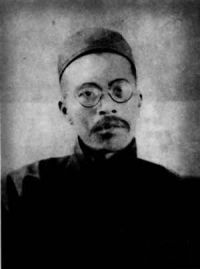Wang Guowei
Wang Guowei (王国维 Dec.3 1877-Jun.2 1927) was a Chinese scholar, writer and poet. A versatile and original scholar, he made important contributions to the studies of ancient history, epigraphy, philology, vernacular literature and literary theory in his academic career.
He was born on December 3, 1877, in Haining, Zhejiang Province, into the family of a bankrupt landlord. He passed the imperial examination at country level in the late Qing dynasty. Wang began his early research of [[Han Shu[[ (Book of Han), ''Shi Ji'' (Records of the Historian) when he was 14, creating a strong foundation for later studies.
From 1904, he began to read Western philosophy and literary works. He employed Arthur Schopenhauer's philosophy in ''Hongloumeng Pinglun'' (1904; "Comments on Dream of Red Mansions"), his analysis of the classic Chinese novel which compared Hongloumeng with Faust, which was the first to employ the comparative method in studying literature.
From 1907, Wang started opera studies. Prior to the 1911 Revolution, he had written several influential monographs and papers, such as The Origin of Opera, Studies on Tang and Song Dynasties'Daqu Music, Catalog of the Opera, and so on.
After the 1911 Revolution, Wang, together with Luo Zhenyu, moved to Japan with their families and there completed Studies on Song and Yuan Dynasty Opera, which created a sensation in Japan and became a hot topic among Sinologists. From then on, Wang was deeply absorbed in the study of classics and history.
Studies on Song and Yuan Dynasty Opera (also known as History of Song and Yuan Dynasty Opera) is a summary of Wang's study of Xiqu (Chinese traditional opera). In it, he set a high value on Chinese traditional opera, further advanced his theory of realm in drama study, and first sketched the outline of Chinese Xiqu history, promoting a boom in study of the opera form.
Wang returned to Shanghai in 1916, successively hold directorships in the institutes of Chinese literature at Cangshangmingzhi University and Peking University. In 1923, by order of Puyi, the last emperor of the Qing dynasty, Wang acted as Nanshufang Xingzou (a literary attendant in the South Chamber) to serve the imperial house. In 1925, he was engaged by Tsinghua University as a tutor at the Research Institute of Chinese National Culture. In 1927, he drowned himself in Kunming Lake in the Summer Palace as a revolutionary army was about to enter Beijing.
Wang was the first to apply Western philosophy aesthetics, and literary theory to the study of Chinese history and literature, profoundly influencing historiography in China. He combined the essence of Chinese literature with that of Western literature and put forward a complete theory of literature and art, with the "theory of realm" as its core.
